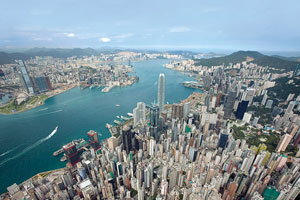House prices down 2.44% during Q2 2019
Hong Kong's housing market boom is now over, with residential property prices falling by 2.44% during the year to Q2 2019, in stark contrast to a y-o-y rise of 13.64% in Q2 2018. However house prices rose 2.64% q-o-q during the latest quarter (Q2 2019). The slowdown is mainly due to slowing demand from Chinese homebuyers, deteriorating affordability, rising mortgage rates, as well as the adverse impact of the ongoing US-China trade war. The worsening social unrest across Hong Kong is also negatively affecting investor confidence.

In recent years, Hong Kong’s government has leaned against property price rises. The government raised stamp duties for all non-first time homebuyers starting November 2016 and cut allowable loans on residential and commercial properties in May 2017. In June 2018, Chief Executive Carrie Lam revealed another series of cooling measures, including a tax on vacant flats.
Demand is mixed; construction surging
In the first half of 2019, the number of primary sales in Hong Kong skyrocketed by 63.2% y-o-y to 12,539 units and the value of sales rose by 22.4% y-o-y to HK$ 136.96 billion (US$17.46 billion), according to the Ratings and Valuation Department (RVD). But in the secondary market sales fell 16.1% to 21,981 units in H1 2019 from a year earlier, while sales value fell by 12.3% to HK$ 183.79 billion (US$23.43 billion).
Residential construction continues to rise. In 2018, completions surged 18% to 20,968 units from the previous year, after y-o-y rises of 22% in 2017 and 29% in 2016.
Rents, rental yields: poor yields, at just above 2%
Apartment costs in Hong Kong are very high, at around $28,570 per sq. m.
| Hong Kong: typical city centre apartment buying price, monthly rent (130 sq. m) | |||
| Buying price | Rate per month | Yield | |
| $3,714,113 | $7,267 | 2.35% | |
Recent news: Sharp economic slowdown amidst US-China trade war, domestic social unrest
Hong Kong’s economy is slowing sharply, due to the fragile global outlook, the ongoing trade dispute between the US and China and the worsening domestic social unrest continue to dampen domestic activity.
Hong Kong’s economy grew by just 0.5% in Q2 2019 from a year earlier, a slowdown from expansions of 0.6% in Q1 2019, 1.2% in Q4 2018, 2.9% in Q3 2018 and 3.5% in Q2 2018. This is the weakest growth since the aftermath of the global crisis a decade ago. Secretary of Finance Paul Chan recently lowered his 2019 growth forecast for HK’s economy to between 0% and 1%, down from the previous estimate of 2% to 3% and from growth of 3% in 2018.
Waves of increasingly violent mass protests have swept across Hong Kong in the past four months, triggered initially by the introduction of an extradition bill that residents see as China’s latest attempt to erode their political freedoms.
In an effort to buoy the slowing economy, the government recently announced a HK$ 19.1 billion (US$2.44 billion) stimulus package that includes higher salary tax rebates and subsidies for the underprivileged and medium-sized businesses.